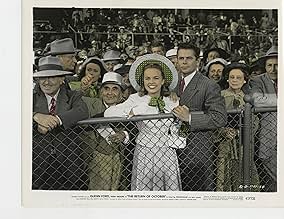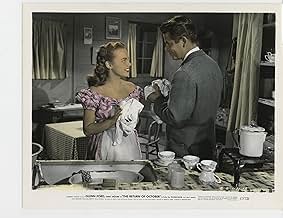Since Mr. Deeds Goes To Town and Broadway Bill were owned by Columbia Pictures, I'm figuring that Harry Cohn thought he could do just about anything he wanted with those two Frank Capra classics. But it might have been nice if Capra and authors Clarence Buddington Kelland and Damon Runyon got some kind of acknowledgment in the credits for The Return Of October. Elements of both films are combined in the plot of The Return Of October.
Young Terry Moore has grown up around racetracks being raised by her uncle Willie played by James Gleason who is a track character. All his life he's wanted like millions of other owners to own and train a Kentucky Derby winner. But he dies before he accomplishes the goal.
Ms. Moore goes to live with her rich aunt Dame May Witty in what was her farewell screen role, but can't keep away from the track. With the help of Deeds like psychology professor Glenn Ford she buys a race horse who with certain mannerisms and incidents Moore thinks is James Gleason returned.
Ford's got those publish or perish problems that university professors perennially have and he hits upon the idea of publishing a paper on Terry Moore's obsession about the horse being her reincarnated uncle. In this he's unwittingly used like Jean Arthur's articles to bring Gary Cooper down by some unscrupulous relatives of Moore and Witty when Witty passes away.
If you've seen Mr. Deeds Goes To Town and Broadway Bill you know exactly where this whole story is going and how it will end.
The Return Of October does not come anywhere near being the classic that either of those films does. It still is an enjoyable fantasy with a lot of very good players penciled into parts that fit them well. I'm only sorry the story called for James Gleason to die so soon because he's always fun.
One of the great Hollywood stories that Frank Capra told was how Harry Cohn had stuck Capra's name on another film from Columbia to boost it in overseas markets. This caused Capra to leave Columbia when his contract was up, but the real upshot of that story was that Cohn would not even see that he did anything wrong.
Bearing that in mind it certainly is easy to see how Cohn could take two Capra classics and rework them and not give Capra nor two distinguished authors any credit at all.
The film was shot at Santa Anita racetrack with some establishing shots of Churchill Downs for the climax.
The Return Of October is no classic, but a pleasant piece of entertainment in any event.


































